Unit 7 Will people have robots? Section A(1a-2d)公开课 课件(共43张PPT,内嵌音频)
文档属性
| 名称 | Unit 7 Will people have robots? Section A(1a-2d)公开课 课件(共43张PPT,内嵌音频) | 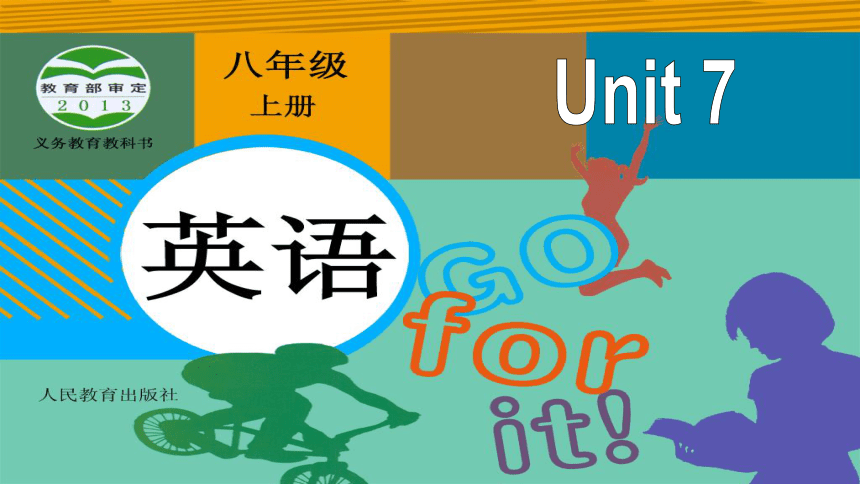 | |
| 格式 | zip | ||
| 文件大小 | 17.3MB | ||
| 资源类型 | 教案 | ||
| 版本资源 | 人教新目标(Go for it)版 | ||
| 科目 | 英语 | ||
| 更新时间 | 2021-11-18 14:24:51 | ||
图片预览

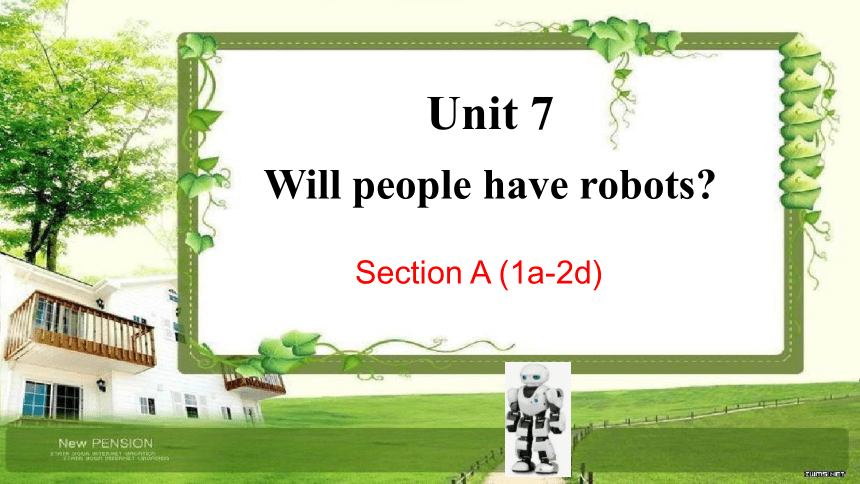
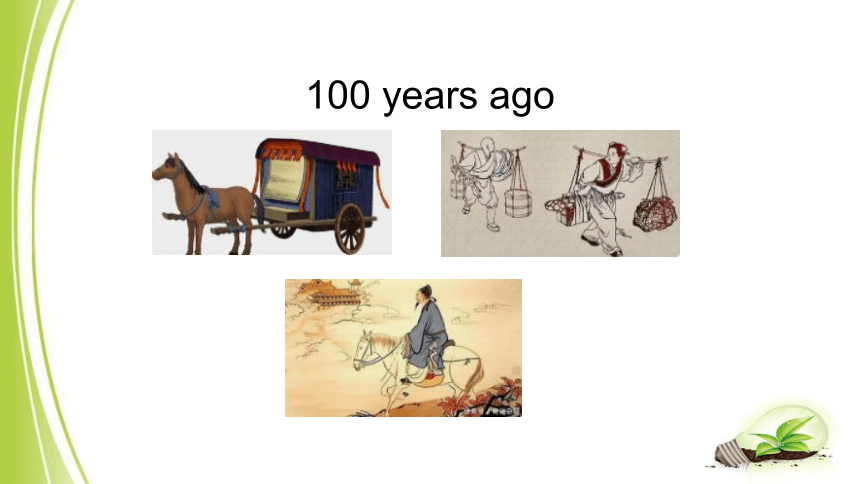

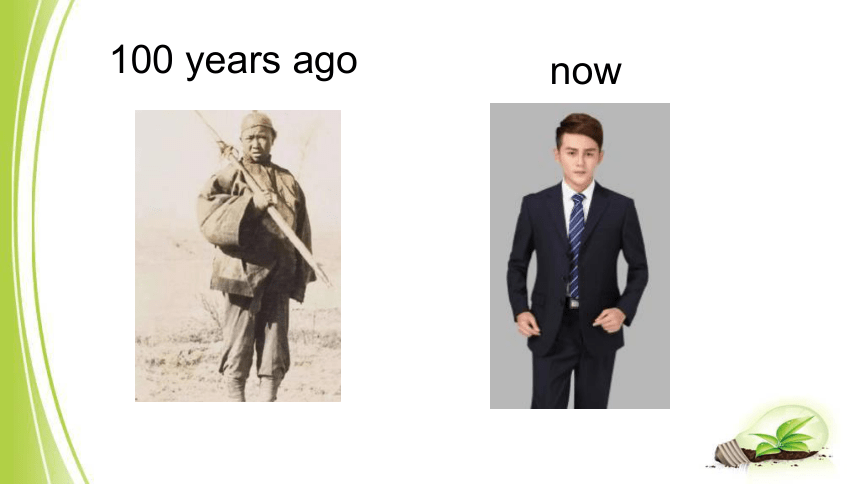
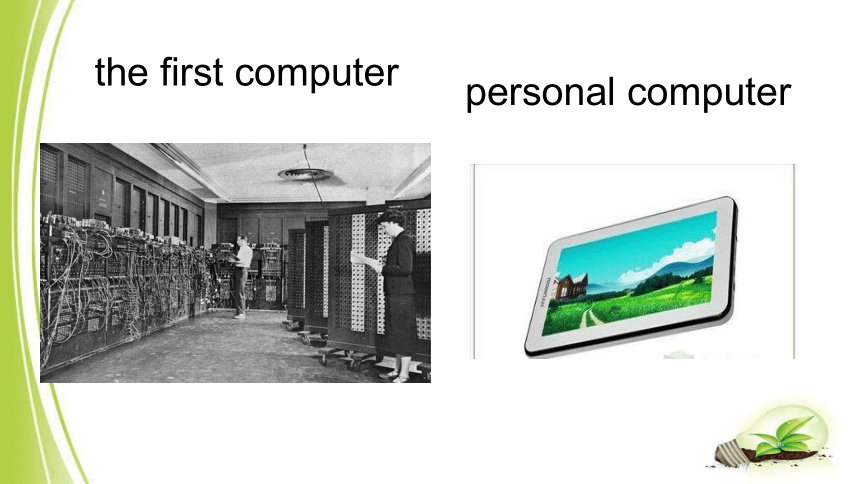
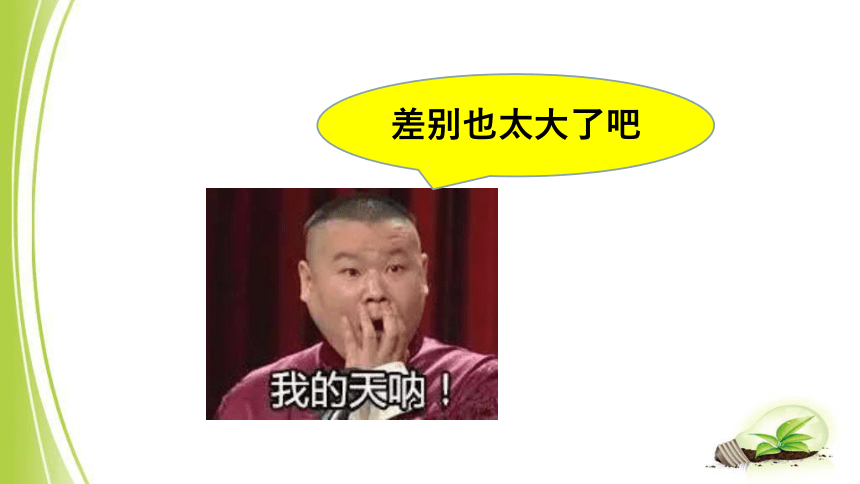
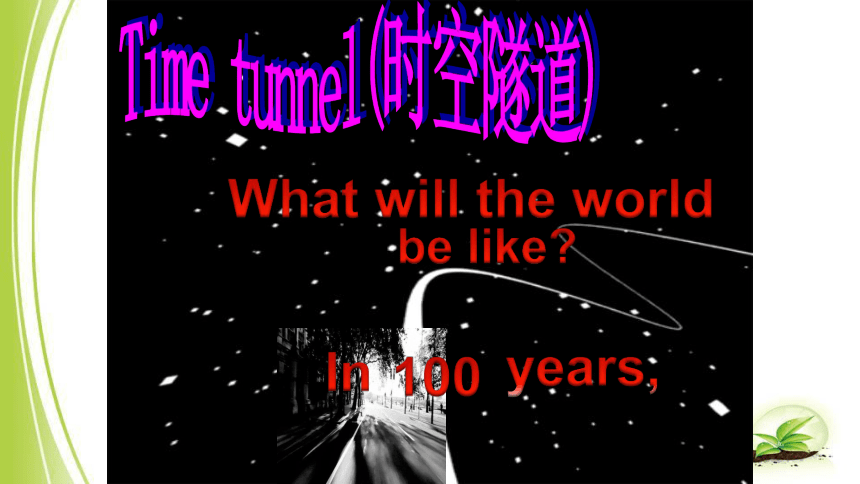
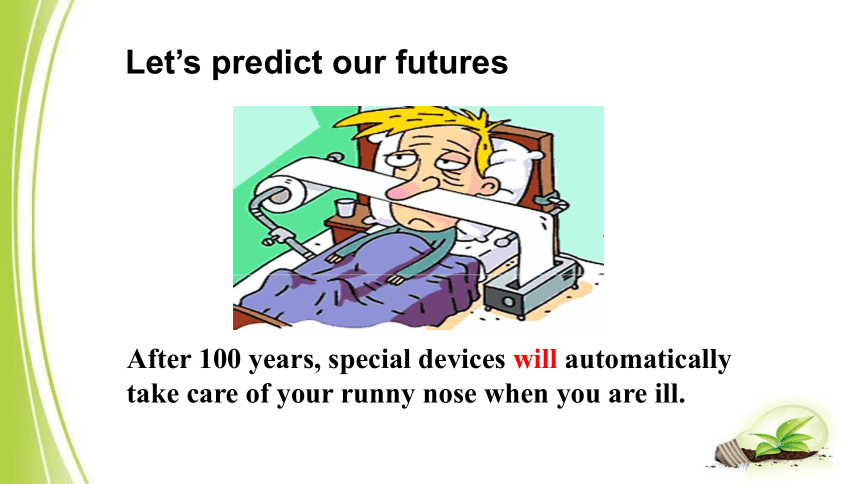
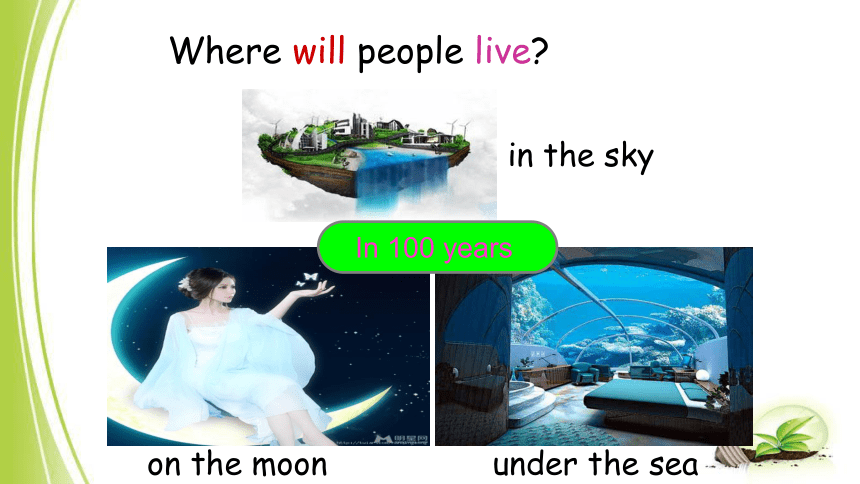
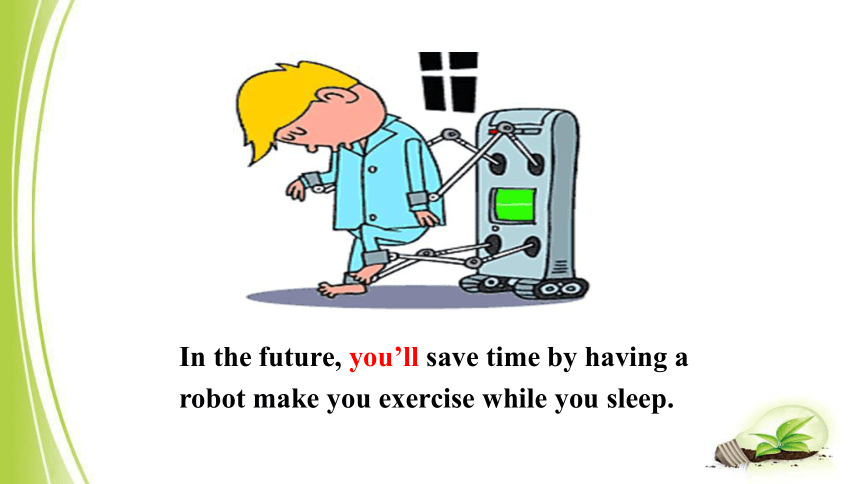
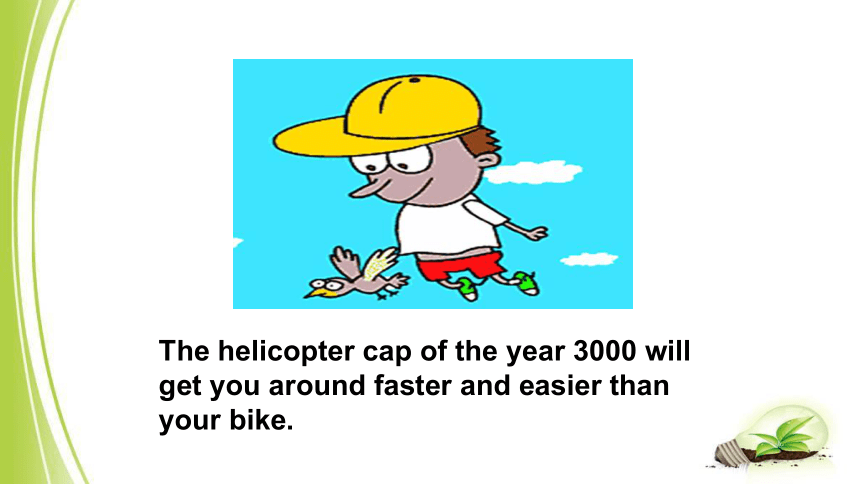
文档简介
(共43张PPT,内嵌音频)
Unit 7
Section A (1a-2d)
Unit 7
Will people have robots
100 years ago
now
100 years ago
now
the first computer
personal computer
差别也太大了吧
Time tunnel(时空隧道)
Let’s predict our futures
After 100 years, special devices will automatically take care of your runny nose when you are ill.
on the moon
Where will people live
in the sky
under the sea
In 100 years
In the future, you’ll save time by having a robot make you exercise while you sleep.
The helicopter cap of the year 3000 will get you around faster and easier than your bike.
You won’t carry a backpack.
It will carry you.
People won’t use money.
Everything will be
×
$ 0
$ 0
$ 0
$ 0
free.
In 100 years
How will the world be different in the future, 100 years from now Read these predictions. Check (√) A (for agree) or D (for disagree).
1a
A D 1. People will have robots in their homes.
A D 2. People won’t use money. Everything will be free.
A D 3. Books will only be on computers, not on paper.
A D 4. Kids won’t go to school. They’ll study at home on computers.
A D 5. There will be only one country.
A D 6. People will live to be 200 years old.
1. People will have robots in their homes.
2. People won’t use money. Everything will be free.
3. Books will only be on computers, not on paper.
4. Kids won’t go to school. They’ll study at home on computers.
5. There will be only one country.
6. People will live to be 200 years old.
Listening
Listen and circle the predictions you hear.
1b
Listen and fill in the blanks.
A: Do you _____ people will ____ ______ in their homes in 100 _____
B: Yes, I do. I saw a robot on TV, and it _______ the kitchen.
A: Well, I don’t think people ___ ___ money.
B: Do you think everything will __ ____
A: Yeah, ________ .
B: I think there will be ____ one _______ .
think
have robots
years
cleaned
will use
be free
probably
only
country
A: Only one _______ in the world
Will there ___ world _____
B: I _____ so.
A: I ____ kids _____ go to school. They will _____ at home on _________ .
B: Oh, I ________ .
A: You do
B: Yeah, there will ______ be schools.
country
be
peace
hope
think
won’t
study
computers
disagree
always
1c
Ask and answer questions about the predictions in 1a.
A: Will people use money in 100 years
B: No, they won’t. Everything will be free.
Will people live to be 200 years old
A: Yes, they will.
1. People will have robots in their homes.
2. People won’t use money. Everything will be free.
3. Books will only be on computers, not on paper.
4. Kids won’t go to school. They’ll study at home on computers.
5. There will only be one country.
6. People will live to be 200 years old.
Read loudly loudly loudly!!!
2a Listen and circle the words you hear.
There will be(more / less / fewer)people.
There will be (more / less / fewer) free time.
There will be (more / less / fewer) cars.
There will be (more / less / fewer) pollution.
There will be (more / less / fewer) trees.
more trees
more water
可数名词
more +
不可数名词
less meat
less + 不可数名词
fewer people
fewer + 可数名词
fewer less more
fewer 更少的, 修饰可数名词
less 更少的, 修饰不可数名词
more 更多的, 可以修饰可数和不可数名词
Remember:
many—more—most much—more—most
few—fewer—fewest little—less—least
修饰可数名词 修饰不可数名词
试做以下试题:
①I earn ______ money than my sister.
②There are ______ cars parked outside than yesterday.
③We have ______ students this year than last year.
④You ought to smoke ______ cigarettes and
drink _____ beer.
fewer
fewer
fewer
less
less
2b
Listen again. Check(√)the predictions you hear.
____ 1. There will be fewer people.
____ 2. There will be less free time.
____ 3. People will use the subways less.
____ 4. There will be more pollution.
____ 5. Cities will be very big and crowded.
√
√
Pairwork
Make conversations about the predictions in 2a and 2b.
What’s your prediction about the future
I think there will be more pollution.
2c
Really I don’t think so. But I think there will be fewer trees.
What’s your prediction about the future
I think cities will be very big and crowed.
Sure. I agree with you. And I think there will be more pollution.
Read the conversation quickly and answer questions.
2d
1.What will the future be like according to the book about the future
2. What can people do to save the earth
Cities will be more crowded and polluted. There will be fewer trees and the environment will be in great danger. Maybe people will have to move to other planets.
We can use less water and plant more trees. Everyone should play a part in saving the earth.
2d
Role-play the conversation.
Nick: What are you reading, Jill
Jill: It's a book about the future.
Nick: Sounds cool. So what will the future be like
Jill: Well, Cities will be more crowded and polluted. There will be fewer trees and the environment will be in great danger.
Nick: That sounds bad! Will we have
to move to other planets
Jill: Maybe. But I want to live on the earth.
Nick: Me, too. Then what can we do
Jill: We can use less water and plant more trees.
Everyone should play a part in saving the earth.
Language points
1.Do you think there will be robots in people’s homes
你认为人们家里将有机器人吗?
这是一个含有宾语从句的主从复合句。其中,“Do you think”是主句部分,“there will be…”是从句部分,从句部分整个句子作为think 的宾语。
如果do you think放在句中,则为插入语,常放在疑问词之后,结构为:疑问词+do you think+主语+谓语+其他成分?
Do you think he is a teacher 你认为他是一名老师吗?
there will be意为“将有;会有”,是there be句型的一般将来时,可以与there is/are going to be进行句式转换,它们相对应的否定形式是there won’t be或there isn’t going to be。
特别注意:这两种形式中的be都是be动词原形,不能改成其他动词。
例:There is going to be a sports meeting tomorrow.
明天将有一场运动会。
there be句型遵循“就近一致”的原则,即离be近的是单数或不可数名词,be动词就用单数;离be近的是复数名词,be动词就用复数。
There is a book and two pens on the teacher’s desk.
讲台上有一本书和两支笔。
There are two pens and a book on the teacher’s desk.
讲台上有两支笔和一本书。
2. People will live to be 200 years old.
人们将会活到200岁。
live to be+基数词+years old,意思是“活到……岁”。其中live作动词,意为“活……;生活”。
Dogs can live to be fifteen years old.狗能活15年。
(1)live on sth.意为“靠……为生”,这里的sth.常为表示“食物”的名词;live on sb.则表示“靠某人生活”。
Most Asians live on rice. 大多数亚洲人以大米为主食。
(2)live by...表示“靠……(手段)谋生”, by后通常跟表示方式、手段的动名词。
The old man lives by hunting. 这位老人靠捕猎为生。
3.Will people use money in 100 years
100年以后人们还使用钱吗?
in 100 years意为“在100年以后”,其中in为介词,其后跟一段时间表示“在……之后”,通常用于一般将来时,对其提问要用how soon(多久以后)。
I will come back in a week.我将在一周后回来。
in与for
in
for
表示以现在为起点的将来某一段时间之后
用how soon提问
表示某个动作或状态持续多长时间
用how long提问
5.Everyone should play a part in saving the earth.
每个人都应当尽一份力来拯救地球。
play a part in… 意为“参与……;在……中扮演角色;在……中起作用”,相当于play a role in… 。
使用时经常在part或role的前面加no,(not) any, important, significant等形容词修饰。
该短语为动宾结构短语,in后接名词或动名词。
He played an important part in the TV show.
他在那部电视剧中扮演一个重要的角色。
1. 我们用___________时态对未来进行预测,其结构为________________。
疑问式:______________ 肯定回答:____,主+_____.
否定回答:____,主+_____.
否定式:_____________
2. 当我们说“将会有……”时,我们用_________________。
否定句:____________
疑问句:____________ 肯定回答:
否定回答:
What do you learn in this lesson
Sum up(总结)
Will +动词原形
一般将来
will 提到句首
won’t +动词原形
There will be
There won't be
Will there be
Yes,there will.
No,there won't.
Yes will
No won't
1. I won’t ______________(be) free tomorrow.
2. The students _____________(have) a meeting this weekend.
3.Lily______________________(stay) with me tonight.
4. It’s _________________________(rain) this evening.
5. We _____________________(visit) uncle Lee next week.
6. There _______________(be) a football match in our school.
7. _________you_________ (be) free tomorrow
8. My sister _____________( not move )to France this year.
9. There will be fewer factories in Qian’an.(变一般疑问句)
be
will have
will stay
going to rain
will visit
will be
Will be
won’t move
Will there be fewer factories in Qian’an
Homework
将来100年后的生活会是什么样的?请你写出六个预言。
I think… in 100 years.
…
Unit 7
Section A (1a-2d)
Unit 7
Will people have robots
100 years ago
now
100 years ago
now
the first computer
personal computer
差别也太大了吧
Time tunnel(时空隧道)
Let’s predict our futures
After 100 years, special devices will automatically take care of your runny nose when you are ill.
on the moon
Where will people live
in the sky
under the sea
In 100 years
In the future, you’ll save time by having a robot make you exercise while you sleep.
The helicopter cap of the year 3000 will get you around faster and easier than your bike.
You won’t carry a backpack.
It will carry you.
People won’t use money.
Everything will be
×
$ 0
$ 0
$ 0
$ 0
free.
In 100 years
How will the world be different in the future, 100 years from now Read these predictions. Check (√) A (for agree) or D (for disagree).
1a
A D 1. People will have robots in their homes.
A D 2. People won’t use money. Everything will be free.
A D 3. Books will only be on computers, not on paper.
A D 4. Kids won’t go to school. They’ll study at home on computers.
A D 5. There will be only one country.
A D 6. People will live to be 200 years old.
1. People will have robots in their homes.
2. People won’t use money. Everything will be free.
3. Books will only be on computers, not on paper.
4. Kids won’t go to school. They’ll study at home on computers.
5. There will be only one country.
6. People will live to be 200 years old.
Listening
Listen and circle the predictions you hear.
1b
Listen and fill in the blanks.
A: Do you _____ people will ____ ______ in their homes in 100 _____
B: Yes, I do. I saw a robot on TV, and it _______ the kitchen.
A: Well, I don’t think people ___ ___ money.
B: Do you think everything will __ ____
A: Yeah, ________ .
B: I think there will be ____ one _______ .
think
have robots
years
cleaned
will use
be free
probably
only
country
A: Only one _______ in the world
Will there ___ world _____
B: I _____ so.
A: I ____ kids _____ go to school. They will _____ at home on _________ .
B: Oh, I ________ .
A: You do
B: Yeah, there will ______ be schools.
country
be
peace
hope
think
won’t
study
computers
disagree
always
1c
Ask and answer questions about the predictions in 1a.
A: Will people use money in 100 years
B: No, they won’t. Everything will be free.
Will people live to be 200 years old
A: Yes, they will.
1. People will have robots in their homes.
2. People won’t use money. Everything will be free.
3. Books will only be on computers, not on paper.
4. Kids won’t go to school. They’ll study at home on computers.
5. There will only be one country.
6. People will live to be 200 years old.
Read loudly loudly loudly!!!
2a Listen and circle the words you hear.
There will be(more / less / fewer)people.
There will be (more / less / fewer) free time.
There will be (more / less / fewer) cars.
There will be (more / less / fewer) pollution.
There will be (more / less / fewer) trees.
more trees
more water
可数名词
more +
不可数名词
less meat
less + 不可数名词
fewer people
fewer + 可数名词
fewer less more
fewer 更少的, 修饰可数名词
less 更少的, 修饰不可数名词
more 更多的, 可以修饰可数和不可数名词
Remember:
many—more—most much—more—most
few—fewer—fewest little—less—least
修饰可数名词 修饰不可数名词
试做以下试题:
①I earn ______ money than my sister.
②There are ______ cars parked outside than yesterday.
③We have ______ students this year than last year.
④You ought to smoke ______ cigarettes and
drink _____ beer.
fewer
fewer
fewer
less
less
2b
Listen again. Check(√)the predictions you hear.
____ 1. There will be fewer people.
____ 2. There will be less free time.
____ 3. People will use the subways less.
____ 4. There will be more pollution.
____ 5. Cities will be very big and crowded.
√
√
Pairwork
Make conversations about the predictions in 2a and 2b.
What’s your prediction about the future
I think there will be more pollution.
2c
Really I don’t think so. But I think there will be fewer trees.
What’s your prediction about the future
I think cities will be very big and crowed.
Sure. I agree with you. And I think there will be more pollution.
Read the conversation quickly and answer questions.
2d
1.What will the future be like according to the book about the future
2. What can people do to save the earth
Cities will be more crowded and polluted. There will be fewer trees and the environment will be in great danger. Maybe people will have to move to other planets.
We can use less water and plant more trees. Everyone should play a part in saving the earth.
2d
Role-play the conversation.
Nick: What are you reading, Jill
Jill: It's a book about the future.
Nick: Sounds cool. So what will the future be like
Jill: Well, Cities will be more crowded and polluted. There will be fewer trees and the environment will be in great danger.
Nick: That sounds bad! Will we have
to move to other planets
Jill: Maybe. But I want to live on the earth.
Nick: Me, too. Then what can we do
Jill: We can use less water and plant more trees.
Everyone should play a part in saving the earth.
Language points
1.Do you think there will be robots in people’s homes
你认为人们家里将有机器人吗?
这是一个含有宾语从句的主从复合句。其中,“Do you think”是主句部分,“there will be…”是从句部分,从句部分整个句子作为think 的宾语。
如果do you think放在句中,则为插入语,常放在疑问词之后,结构为:疑问词+do you think+主语+谓语+其他成分?
Do you think he is a teacher 你认为他是一名老师吗?
there will be意为“将有;会有”,是there be句型的一般将来时,可以与there is/are going to be进行句式转换,它们相对应的否定形式是there won’t be或there isn’t going to be。
特别注意:这两种形式中的be都是be动词原形,不能改成其他动词。
例:There is going to be a sports meeting tomorrow.
明天将有一场运动会。
there be句型遵循“就近一致”的原则,即离be近的是单数或不可数名词,be动词就用单数;离be近的是复数名词,be动词就用复数。
There is a book and two pens on the teacher’s desk.
讲台上有一本书和两支笔。
There are two pens and a book on the teacher’s desk.
讲台上有两支笔和一本书。
2. People will live to be 200 years old.
人们将会活到200岁。
live to be+基数词+years old,意思是“活到……岁”。其中live作动词,意为“活……;生活”。
Dogs can live to be fifteen years old.狗能活15年。
(1)live on sth.意为“靠……为生”,这里的sth.常为表示“食物”的名词;live on sb.则表示“靠某人生活”。
Most Asians live on rice. 大多数亚洲人以大米为主食。
(2)live by...表示“靠……(手段)谋生”, by后通常跟表示方式、手段的动名词。
The old man lives by hunting. 这位老人靠捕猎为生。
3.Will people use money in 100 years
100年以后人们还使用钱吗?
in 100 years意为“在100年以后”,其中in为介词,其后跟一段时间表示“在……之后”,通常用于一般将来时,对其提问要用how soon(多久以后)。
I will come back in a week.我将在一周后回来。
in与for
in
for
表示以现在为起点的将来某一段时间之后
用how soon提问
表示某个动作或状态持续多长时间
用how long提问
5.Everyone should play a part in saving the earth.
每个人都应当尽一份力来拯救地球。
play a part in… 意为“参与……;在……中扮演角色;在……中起作用”,相当于play a role in… 。
使用时经常在part或role的前面加no,(not) any, important, significant等形容词修饰。
该短语为动宾结构短语,in后接名词或动名词。
He played an important part in the TV show.
他在那部电视剧中扮演一个重要的角色。
1. 我们用___________时态对未来进行预测,其结构为________________。
疑问式:______________ 肯定回答:____,主+_____.
否定回答:____,主+_____.
否定式:_____________
2. 当我们说“将会有……”时,我们用_________________。
否定句:____________
疑问句:____________ 肯定回答:
否定回答:
What do you learn in this lesson
Sum up(总结)
Will +动词原形
一般将来
will 提到句首
won’t +动词原形
There will be
There won't be
Will there be
Yes,there will.
No,there won't.
Yes will
No won't
1. I won’t ______________(be) free tomorrow.
2. The students _____________(have) a meeting this weekend.
3.Lily______________________(stay) with me tonight.
4. It’s _________________________(rain) this evening.
5. We _____________________(visit) uncle Lee next week.
6. There _______________(be) a football match in our school.
7. _________you_________ (be) free tomorrow
8. My sister _____________( not move )to France this year.
9. There will be fewer factories in Qian’an.(变一般疑问句)
be
will have
will stay
going to rain
will visit
will be
Will be
won’t move
Will there be fewer factories in Qian’an
Homework
将来100年后的生活会是什么样的?请你写出六个预言。
I think… in 100 years.
…
同课章节目录
- Unit 1 Where did you go on vacation?
- Section A
- Section B
- Unit 2 How often do you exercise?
- Section A
- Section B
- Unit 3 I'm more outgoing than my sister.
- Section A
- Section B
- Unit 4 What's the best movie theater?
- Section A
- Section B
- Unit 5 Do you want to watch a game show?
- Section A
- Section B
- Unit 6 I'm going to study computer science.
- Section A
- Section B
- Unit 7 Will people have robots?
- Section A
- Section B
- Unit 8 How do you make a banana milk shake?
- Section A
- Section B
- Unit 9 Can you come to my party?
- Section A
- Section B
- Unit 10 If you go to the party, you'll have a grea
- Section A
- Section B
